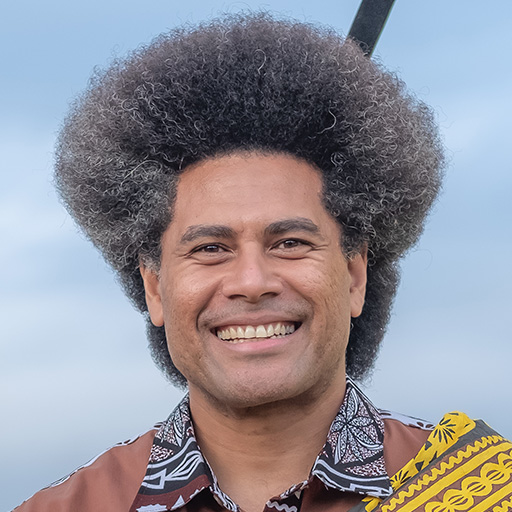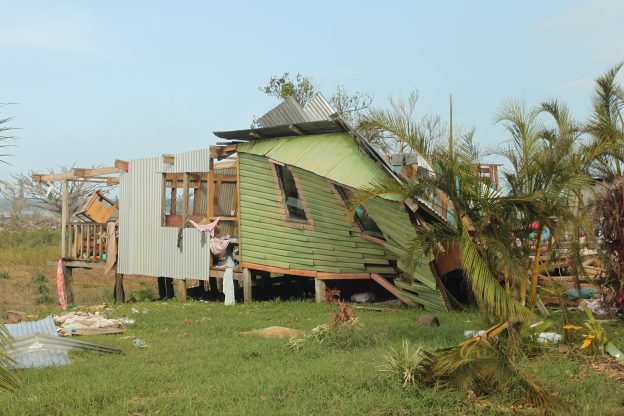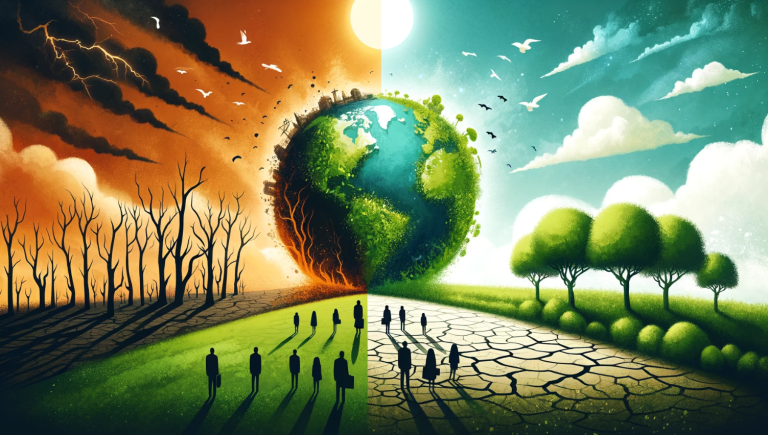Pacific Islanders “have already lost too much to the climate crisis – we refuse to lose any more.”
I grew up on the eastern coast of Fiji’s main island, overlooking Rovodrau Bay and beyond that, the famous Shark Reef Marine Reserve. The link between ocean health, quality of life, and cultural connectivity is something that I and many Fijians instinctively understand. For local fisherfolk, the marine ecosystem determines whether they put food on the table and textbooks in the hands of their children. For a resort worker, shark populations determine whether tourists arrive and experience their wonder. And for myself, a Fijian man raising my son on the coastline of Fiji, sharing with him the history of our cultural ancestors, the octopus and the shark, takes on a new dimension if their habitats are under threat.
All of these parallel experiences of Pacific Islanders across the region hang in the balance as the climate crisis threatens our islands and our oceans. But what of the threats that have already become a reality? Ocean warming and acidification are already affecting fisheries in Asia and the Pacific. The rate of annual sea level rise has more than doubled over the past 30 years, with atoll islands in the Pacific facing the brunt of this acceleration. From 2000 to 2020, the direct and indirect impacts of extreme weather events cost small island states a total of $141 billion. And with each step closer to the 1.5 degree Celsius target limit for global warming, the devastation increases.
Global climate talks have looked to address the impacts of the climate crisis that go beyond adaptation and mitigation. Climate disasters are costing the Pacific eight times more than they did a decade ago, no matter how many seawalls we build. In 2016, Cyclone Winston took 44 lives in Fiji, and any life lost to the climate crisis is a life too many. These impacts have been classified as “Loss and Damage,” with loss being irreversible and permanent, and damage being recoverable or reparable harm (that often comes at a steep cost).
And there are further impacts that we can’t put a cost to, such as the lives lost during Cyclone Winston, or the connection my son may lose with his heritage should our totems, the octopus and the shark, be further threatened. More and more, Pacific Islanders are seeing their way of life and traditions under threat, and we place heavy importance on the ability to protect them from the climate crisis, or recover them after climate impacts.
As we head into COP30 in Belem, Brazil, we take stock of where the global community stands on not only addressing the loss and damage incurred by frontline communities, but also preventing further climate devastation. At COP28 in Dubai, the Fund for Responding to Loss and Damage (FRLD) was established and heralded a major win for small island developing states. Since its establishment, there has been undulating progress, with initial pledges from developed nations and efforts from climate-vulnerable nations to ensure grant-based finance processes to avoid debt lock-ins.
As we head toward negotiations in Belem, it is now against the backdrop of geopolitical tensions and shrinking political space for climate action. Earlier this year, the United States announced its plans to pull out of the FRLD, part of a larger trend from the Trump administration that has seen a 10 percent reduction in overall climate finance.
Given the overwhelming evidence that climate disasters will increase at an unprecedented rate, and the reallocation of global finance away from climate and into things such as military spending, many of us are left wondering – what is the life of a Fijian or a Marshall Islander worth? Is it not worth the same as the life of an American billionaire or a South African tech oligarch? What is the worth of an entire island nation of people? Is it not worth the profits of an oil company? The level of action we are seeing at an international level is woefully inadequate for the scale of this crisis.
A recent ruling by the International Court of Justice says that countries can, in principle, face liability for climate harms, opening the door to potential “reparations” for loss and damage. This milestone for international law and climate justice comes at a time when the multilateral process is struggling to keep an equitable flow of climate finance alive in discussions, rather than geopolitical tug-of-wars and trade deals.
But freeing up finance and technical assistance to compensate communities for immeasurable climate losses is only one part of the solution. We need to put a plug in the proverbial bathtub before we pour into it, and that means an end to climate-destroying fossil fuels. In the 10 years since the Paris Agreement, the Pacific has held the line on 1.5 degrees as a limit for global heating. We have seen wealthy nations dance around the possibility of 2 degrees, and subtly kick at the goalposts in the hopes that they shift far enough to endorse more fossil fuel projects. More oil, more coal, more gas, and less shoreline for our children to run on. Less fish for our aunties to catch, less space to bury our elders, and less room at the table for our people involved in global climate decisions.
This shows us that we need to win this fight on two fronts. We need accessible finance for communities to compensate for the crisis that is currently at our doorstep, and we need to ensure that we avoid reaching a point of no return. This year, countries’ Nationally Determined Contributions (NDCs) are due for review, and many of them already fall woefully short of the commitments made in Paris a decade ago. Our own neighbor, Australia, is yet to submit updated NDCs even as it bids to host COP31 in 2026.
As Pacific Islanders, we have no choice but to hold the line at 1.5 degrees, which is why Pacific Islanders occupied the halls of Australian Parliament last month to demand just that. We must to keep our realities at the front of global consciousness to ensure sufficient finance reaches those who need it most. There is no other option for us.
This September, as we await the submission of the remaining NDCs, the 350.org Pacific Climate Warriors are joining people around the world to draw the line for people, justice, and the planet. We have already lost too much to the climate crisis – we refuse to lose any more. World leaders will descend on New York for the United Nations General Assembly and then onto Belem for COP30. We demand that they hear our call to band together and heed the limit of 1.5 degrees of heating. And as the world looks to our region as potential hosts of COP31, we remind them that this ocean is ours. These islands are ours. This is our line to draw.
Source link : View Article
Author
-

Fenton Lutunatabua is founder of Pacific Climate Warriors and Beyond the Narrative. His work has helped spark a wave of environmental consciousness across the Pacific and beyond.



